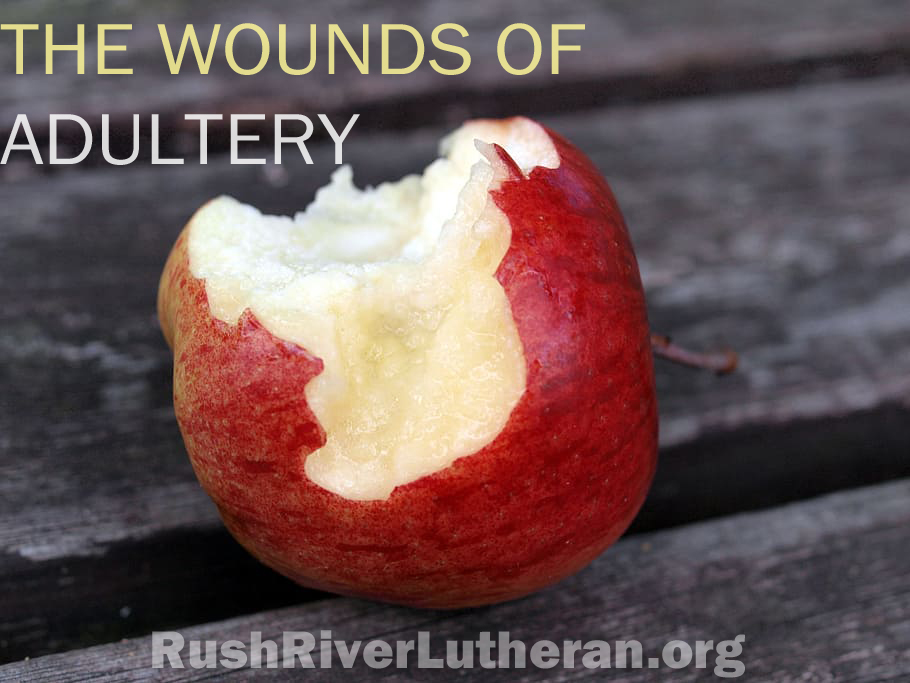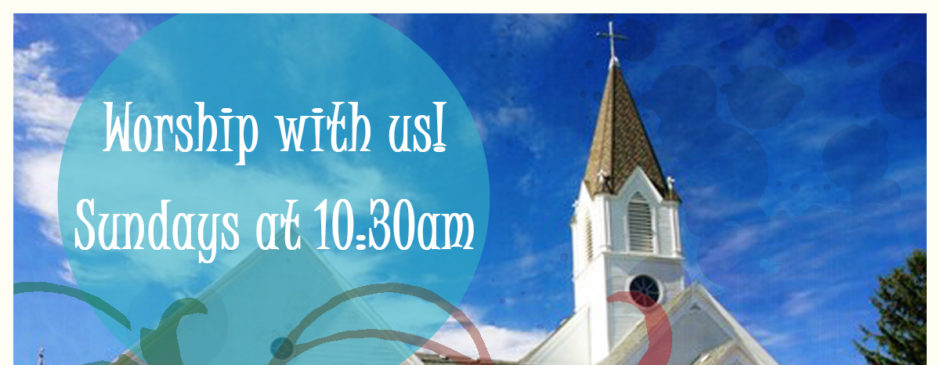A Series of Services for the Season of Lent
Week 4: The Wounds of Adultery

In this service, we remember that the wounds of adultery and unfaithfulness we committed against our Lord were laid on Christ on the cross. Our Lenten observance reminds us that though we have been brought low by sin, our Lord will bless us with new life in him through the cross.
Order of Service
P In the name of the Father, and of the + Son, and of the Holy Spirit.
C Amen.
P Out of his anguish Christ shall see light;
C he shall find satisfaction through his knowledge.
P The righteous one, my servant, shall make many righteous,
C and he shall bear their iniquities.
P Christ was wounded for our transgressions,
C crushed for our iniquities;
P upon him was the punishment that made us whole,
C and by his wounds we are healed.
Confession and Forgiveness
P Let us confess our sin in the presence of God and of one another.
C Most merciful God, we confess to you that we have broken your commandments by our own thoughts, words, and deeds. We are undeserving of your presence; we deserve to be shunned for the impurity within us. We have not loved our brothers and sisters as we ought, and we have not cared for your creation. For the sake of your Son, Jesus Christ, have mercy on us, and give us the healing power of your love that we may walk again in your ways and live to the glory of your holy name. Amen.
P God is gracious and merciful, and he desires that we be made free of the burden of our sins. Through Jesus Christ, who bore the cross for our sake and for the sake of the whole world, there is healing, hope, and life. Your sins are forgiven in the name of the Father, and of the + Son, and of the Holy Spirit.
C Amen.
Scripture Readings
• The Old Testament Reading, Exodus 20:14:
You shall not commit adultery.
• The Epistle Reading, 1 Corinthians 6:9-11:
Do you not know that wrongdoers will not inherit the kingdom of God? Do not be deceived! Fornicators, idolaters, adulterers, male prostitutes, sodomites, thieves, the greedy, drunkards, revilers, robbers—none of these will inherit the kingdom of God. And this is what some of you used to be. But you were washed, you were sanctified, you were justified in the name of the Lord Jesus Christ and in the Spirit of our God.
• The Gospel Reading, Matthew 9:9-13:
As Jesus was walking along, he saw a man called Matthew sitting at the tax booth; and he said to him, “Follow me.” And he got up and followed him. And as he sat at dinner in the house, many tax collectors and sinners came and were sitting with him and his disciples. When the Pharisees saw this, they said to his disciples, “Why does your teacher eat with tax-collectors and sinners?” But when he heard this, he said, “Those who are well have no need of a physician, but those who are sick.” Go and learn what this means, “I desire mercy, not sacrifice.” For I have come to call not the righteous but sinners.’
Children’s Message
Today we’re going to play a little game. It’s called, “Which one is the tallest?” Let’s all stand up together in a row from the tallest to the shortest. (Have your children line up in a row.) Now what if God only liked the really tall people? That would make the short people feel bad, wouldn’t it? Well, there was a time when some people thought that God liked them better than all the rest. And they frowned on the people they thought God didn’t like at all. But Jesus had good news for all people. He joined them all together at his table. (Have the children join in a circle.) Everyone is loved by God through Jesus’ love. There are no distinctions, no classes, no better than someone else; but all are loved.
Let us pray. Lord, we thank you that you love us all and welcome us all as one to be at your table of fellowship and grace. Amen.
Sermon
The story of Jesus dining at table with tax collectors and sinners is shared in all of the first three gospels—Matthew, Mark, and Luke. The have some variations—and the variations are important for the message of each gospel writer—but the point and the context is the same: Jesus sits at table with outcasts and is unashamed. It is a powerful story at the very heart of the gospel about how we are all welcomed and embraced in spite of the truth of our sins.
Later in the Gospel of Matthew, Jesus will speak about how “tax collectors and prostitutes,” because of their faith in him, will enter the kingdom of heaven ahead of others who are self-righteous (21:28-32). In Luke’s Gospel, we hear of Jesus’ intimate encounter with a “sinful woman” at the home of a Pharisee. She washes his feet with her tears and wipes them with her hair. Needless to say, eyebrows are raised and criticisms abound. But Jesus sees it as an act of love and speaks words of endearing forgiveness to her (7:36-50). And in John’s Gospel, we hear the story of a woman who was caught in adultery. Jesus defended her over all her critics: “Let anyone among you who is without sin be the first to throw a stone at her.” All of them left, and the woman was alone with Jesus. Jesus then said to her, “‘Woman, where are they? Has no one condemned you?’ She said, ‘No one, sir.’ And Jesus said, ‘Neither do I condemn you. Go your way, and from now on do not sin again’” (8:1-11).
Tax collectors and sinners were despised socially and religiously. The impurity of Jesus’ association with them could not go unnoticed. But the legalism of those who criticized such association can still be found in the Church today—when the assembly is cold and uninviting to those who do not seem to “fit in.” Such behavior is counter to the truth of Jesus’ mercy, by which we all have been accepted and loved by grace even though we do not deserve it.
For even the religiously faithful who shun the sin of adultery, Jesus broadens the commandment to include lust in our hearts (Matthew 5:27-30). Such covetousness leads us away from the kingdom of heaven and down a path of being swamped in misguided attractions and sexual acts.
Consider David and Bathsheba as an illustration. The first sin of David was his covetous desire for Bathsheba. Everything else that followed—adultery, Bathsheba’s pregnancy, attempts to conceal what he had done, seeing to the death of her husband Uriah, and then taking her in as his own wife—was all rooted from the time he first spotted her bathing on the rooftop.
David would be confronted about his sin by the prophet Nathan. And David would repent deeply for his wrong; though sadly and tragically, the child that Bathsheba had conceived died. Later she would conceive and give birth to Solomon (2 Samuel 11-12). The opening of the Gospel of Matthew also notes this, but does not leave out the scandal of David’s adultery: “David was the father of Solomon by the wife of Uriah” (Matthew 1:6)
Lest we think we are still off the hook even after consideration of these sexual sins, there are other meanings of adultery in Scriptures that hold the people of God accountable. Hosea the prophet was instructed to marry a prostitute and woman of adultery in order to symbolize the depth of Israel’s own chasing after other gods. How much we all have missed the mark when we have pursued other gods in our lives in both word and deed and have left the kingdom of heaven peripheral to our being. We cannot justify ourselves. Luther’s last words, “We are all beggars” may just as well have said, “We are all adulterers.”
Still it is not our own acts of repentance for our adulteries, however warranted such a response is, that finally overcomes the evil and scandal. Such repentance is but the fruit of the incredible grace of Christ who takes the sin of our offenses into himself. Luther noted this is in one of his most profound expositions of the gospel. Christ takes the sins of all humanity into himself, including those of “David the adulterer” (whom Luther explicitly mentions), and bears them to the cross and death; but we are purged from all sin, death, and every evil by Christ’s “cleansing and righteousness.” “And if any remnants of sin were to remain, still for the sake of Christ, the shining Sun, God would not notice them” (LW 26:280).
What we get to celebrate is that Jesus’ association with the lowliest of outcasts means for us and for all people that there are no bounds to his grace. By his wounds on the cross there is the wholeness of healing that no one gets left out from the mercy of God; and no one is an outcast from God’s love.
Prayers
P Let us pray for the Church, for all in need, and for the whole of God’s creation. That throughout these forty days of Lent, you may give your people hope that it is Jesus, our Lord, who leads the way and takes into his body on the cross the sins of the whole world.
C Heal us, O God.
P That we come to the truth that all are favored in your grace, and that we are all welcomed in your presence.
C Heal us, O God.
P That all who have been excluded in life, those who are in prisons, those who are alone, infirm, unloved, or bullied, that they may all know that your love is constant and will not abandon them.
C Heal us, O God.
P That people of differing ages, genders, classes or views may put away all malice and work together for wholeness and healing in the world.
C Heal us, O God.
P For those who are dying, that they may trust in the banquet with all the saints at the final table in your kingdom with Christ, our Lord.
C Heal us, O God.
P Into your healing, wounded hands for our sake, we commend all for whom we pray.
C By Christ’s wounds, we are healed. Amen.
Lord’s Prayer
Blessing
P May the healing presence of almighty God, Father, + Son, and Holy Spirit, be with you now and always.
C Amen.
By Michael Hoy. © 2020 Creative Communications for the Parish, a division of Bayard, Inc., 1564 Fencorp Dr., Fenton, MO 63026. 800-325-9414. www.creativecommunications.com. All rights reserved.
